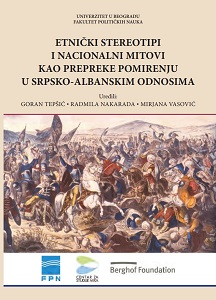
We kindly inform you that, as long as the subject affiliation of our 300.000+ articles is in progress, you might get unsufficient or no results on your third level or second level search. In this case, please broaden your search criteria.

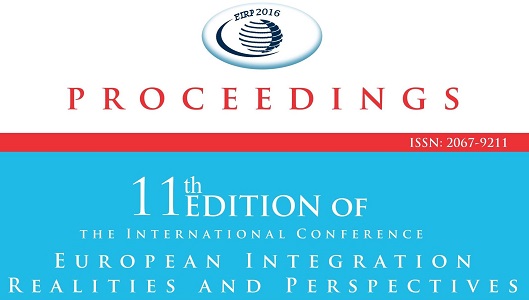
EIRP Proceedings containing the works of the International Conference on European Integration - Realities and Perspectives, bring together all the submitted and presented contributions, providing a conclusive and accessible view to all who wish to feel the beat of research. The conference is international offering to researchers the opportunity of showing their works across the world.
More...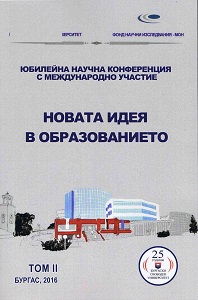
The twenty-five-year anniversary of Bourgas Free University, the "New Idea in Education" is unquestionably not only a time of reflection but also a jubilee of the respectful respect for the founders, all the professors, employees and students who built themselves in its creation and Development despite difficulties over the uneven road over the years. It is our duty and responsibility to transfer everything good from experience, effort and traditions to the future. This is good for the next, and it will not be much easier for them in the real world.
More...
The monograph seeks the rational foundations of marriage and discovers those internal and external to human relationships factors that make it necessary, sustainable and effective.
More...
The purpose of this monograph is to contribute to and enrich the conceptual framework of developing the naval education system in the Republic of Bulgaria in the changing environment. The author's primary focus is on: research into general theoretical problems of how the naval education system functions; analysis of the environment in which this system functions; generating approaches and directions for the development of the national naval education in the changing environment. This research can be used for the purposes of preparing the management of the military education institutions.
More...
The subject of holiness and its historical and contemporary dimensions has proven to be a cross point for the research interests of academics with a different academic background profile - theologians and historians, anthropologists and sociologists, art historians and pedagogues. This allowed the discussions to cross the boundaries of the single disciplines and to outline a rich and multidimensional image of research phenomenon. The vast variety of positions proved how beneficial could be the "Scientific diversity" and the lack of paradigmatic dogmatism outlined by the academic tolerance has turned this first conference into a forum for free exchange of views and opinions. This was particularly important for young scientists involved, for which the access to such scientific forums is often limited by institutional ones or other reasons. The collection we bring to the attention of readers reflects the current state of scientific thought on the theme of holiness.
More...
Monografia Karola Muszyńskiego jest publikacją bardzo cenną. Zwrócę uwagę na jej główne walory: zawiera szczegółowe omówienie procesów społeczno-gospodarczych, przytacza kluczowe statystyki oraz daje wielostronną wiedzę encyklopedyczną o stosunkach pracy po 2008 roku. […]Zamiarem Autora było przyjęcie perspektywy nowego instytucjonalizmu z zakresu socjologii prawa i socjologii ekonomicznej oraz doktryny prawa pracy, a także zastosowanie tego wielowymiarowego aparatu do analizy przemian w regulacjach dotyczących głównie rynku pracy. Autor nie ograniczył się do stosowania narzędzi zastanych, lecz opracował własny schemat teoretyczny, a ponadto rozszerzył treść pojęć funkcjonujących w literaturze przedmiotu. […] W tym względzie Karola Muszyńskiego charakteryzuje śmiałość w konstruowaniu własnej perspektywy, czy może nawet własnego paradygmatu.z recenzji prof. dr. hab. Juliusza Gardawskiego
More...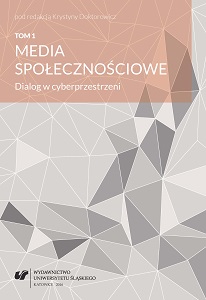
The present volume constitutes the first part of the collection of texts devoted to the problem of social media – the phenomenon of contemporary participatory culture. Social media, which have become the indicator of successive stage in the development of the Internet called Web 2.0, organize the social life of their users in more and more extensive range. The effects of the development of social media and their influence on future social relations is hard to anticipate in view of tech acceleration and rapid social changes. Nevertheless, the increase in the number of users and their internet activity forces the researchers to undertake the problem of social media in the context of numerous academic disciplines. [fragment of preface]
More...
The spatial dimension of the careers of business people has been reconstructed in this publication. These are the people who are particularly predisposed to design space in which they then achieve both their private and professional goals. Changes they create in their work environment and beyond affect not only them or their closest ones but also members of the organization they work at as well as partners, competitors and co-operators. This monograph presents various interconnected yet qualitatively differentiable stages in their perception of space and actions taken towards it: from treating space as a resource, through managing it, up to controlling it. The effectiveness of the control is linked with the career-construction model – prevalent among, and typical of, people playing key organizational roles – which is based on an intentional, pragmatic management of the career path and life plan. The book’s target audience are both theoreticians and practitioners of organization management as well as all readers interested in the interpretative paradigm and qualitative research methods, particularly the grounded theory approach.
More...
This publication relates the history of the tenement at 3 Uniwersytecka St. in Łódź, originally designed as a place of residence for the teachers of the Merchant Assembly School (Polish: Szkoła Zgromadzenia Kupców) of the city of Łódź (1898-1939). Since 1945 it has been a university building. It used to house the flats of the founding professors of Łódź University (including Professor Tadeusz Kotarbiński’s – the first rector of the University of Łódź) as well as science departments. Until the early 1990s, private and public space coexisted here, which made it a place with a special and unique atmosphere. The Scholars’ House is also interesting when viewing the transformation of Łódź University, as it reflected the ups and downs of the university itself during the time of the Polish People’s Republic. The book presents the story of the tenement at 3 Uniwersytecka St. and the complicated lives of its residents in postwar Poland. It also describes the difficulties of forming an academic environment in Łódź – a working-class city with no scholarly traditions.
More...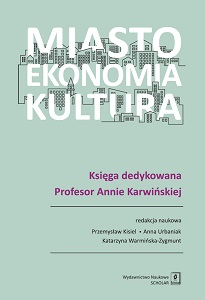
Głównym wątkiem tej książki, choć nie jedynym, jest oczywiście miasto, którego badaniu Anna Karwińska poświęciła wiele lat swojej pracy naukowej. W tomie znajduje się siedemnaście tekstów, które zostały podzielone na trzy grupy tematyczne. Pierwsza zawiera artykuły poświęcone szeroko rozumianej problematyce współczesnego miasta – dominuje w nich refleksja nad tożsamością miasta oraz współczesnymi procesami jego transformacji. W drugiej grupie znajdują się teksty, które stanowią empiryczne egzemplifikacje różnorodnych kwestii związanych z miejskością – omawiane m.in. na przykładzie Gliwic, Łodzi, Kassel czy Krakowa. Książkę kończą rozważania na temat kultury organizacyjnej, przemian mentalnych młodzieży, patriotyzmu oraz tożsamości i pamięci kolektywnej.Autorzy: Patrycja Bałdys, Krzysztof Bierwiaczonek, Agnieszka Brzosko-Sermak, Ewa Cierniak-Szóstak, Małgorzata Dymnicka, Frank Eckardt, Juliusz Gardawski, Magdalena Jelonek, Jacqueline Johnson, Przemysław Kisiel, Ewa Klima, Katarzyna Kwarcińska, Andrzej Majer, Jerzy Mikułowski Pomorski, Tomasz Nawrocki, Andrzej Słaboń, Ewa Ślęzak, Anna Urbaniak, Katarzyna Warmińska-Zygmunt, Grzegorz Węcławowicz.
More...
Problematyka władzy lokalnej jest z natury rzeczy bardzo szeroka i podejmowana przez przedstawicieli różnych dyscyplin naukowych. Każda z nich koncentruje się na nieco innym aspekcie funkcjonowania władzy lokalnej. W niniejszej monografii, mającej charakter przede wszystkim politologiczny, podjęto próbę odpowiedzi na dwa zasadnicze pytania badawcze:1. Jakie społeczność wiejska miała polityczne i prawne możliwości udziału w wyłanianiu władz lokalnych oraz w zarządzaniu sprawami lokalnymi?2. Jaką rolę w tym poszerzaniu (lub ograniczaniu) możliwości partycypacji odgrywały zmieniające się podziały terytorialne obszarów wiejskich? [Ze wstępu]
More...
Czy Polska radzi sobie ze swoją przeszłością? Na tle innych państw jej przypadek jest jednym z najbardziej skomplikowanych. Geopolityczne położenie spowodowało, że nasz kraj stał się w dwudziestym wieku miejscem dramatycznych wydarzeń historycznych. Wystarczy wymienić dwa reżimy totalitarne, dwie wojny, masowe morderstwa, trwanie i rozpad autorytarnego reżimu komunistycznego. Polakom, których kraj znalazł się w sercu tych wydarzeń, przypadło wiele różnych ról: bohaterów, ofiar, ale i krzywdzicieli oraz biernych obserwatorów. Zdarzało się, że wszystkie te role przeplatały się w jednej biografii. Niniejsza książka jest drugą częścią dwutomowego opracowania, zawierającego najważniejsze teksty na temat rozliczenia trudnej przeszłości w perspektywie polskiej i międzynarodowej. Zebrane w niej artykuły dostarczają czytelnikowi źródeł do refleksji nad przypadkiem polskim w kontekście Europy Środkowo-Wschodniej. Czytelnicy znajdą tu teksty Natalii Szablewskiej i Saschy-Dominika Bachmanna, Romana Davida i Susanne Y.P. Choi, Jánosa Kisa, Jarosława Kuisza, Michała Łuczewskiego, Jana-Wernera Müllera. Lecha M. Nijakowskiego, Tomasza Sawczuka, Evelyne Schmid i Aoife Nolan, Wojciecha Sadurskiego, Lavinii Stan, Ruti G. Teitel oraz Karoliny Wigury. Karolina Wigura jest adiunktem w Instytucie Socjologii Uniwersytetu Warszawskiego i współdyrektorką programu „Knowledge Bridges: Poland – Britain – Europe” w St Antony’s College na Uniwersytecie Oksfordzkim, którego opiekunem naukowym jest Timothy Garton Ash. Szefowa Obserwatorium Debaty Publicznej Kultury Liberalnej. Studiowała na Uniwersytecie Warszawskim i Uniwersytecie Ludwiga Maximiliana w Monachium. Stypendystka m.in. wiedeńskiego IWM i GMF. Opublikowała książkę Wina narodów. Przebaczenie jako strategia prowadzenia polityki (WN Scholar 2011), wyróżnioną nagrodą im. J. Tischnera. Jarosław Kuisz jest adiunktem na Wydziale Prawa i Administracji Uniwersytetu Warszawskiego i współdyrektorem programu „Knowledge Bridges: Poland – Britain – Europe” w St Antony’s College na Uniwersytecie Oksfordzkim, którego opiekunem naukowym jest Timothy Garton Ash. Redaktor naczelny istniejącego od 2009 r. polityczno-kulturalnego tygodnika internetowego Kultura Liberalna. Chercheur étranger associé w Institut d'histoire du temps présent w Paryżu. W latach 2016–2018 Marie Skłodowska-Curie Fellow w SAXO Institute na Uniwersytecie Kopenhaskim. Wydał m.in. książkę Charakter prawny porozumień sierpniowych 1980–1981 (Trio 2009) oraz wspólnie z Markiem Wąsowiczem dwa zbiory szkiców Prawo i literatura. Szkice (WN Scholar 2015, 2017).Wojciech Sadurski jest profesorem na Uniwersytecie w Sydney i Uniwersytecie Warszawskim, a w trymestrze wiosennym 2018 również profesorem wizytującym w Yale Law School. Wykładał także w New York University School of Law, Cardozo Law School, Cornell Law School, National University of Singapore oraz na Uniwersytecie w Trydencie. Ostatnio opublikował książki:Constitutionalism and the Enlargement of Europe (OUP 2012), Equality and Legitimacy (OUP 2008) oraz Rights before Courts(Springer 2005, 2014). Obecnie pracuje nad książkami na temat kryzysu konstytucyjnego w państwach Europy Środkowej i Wschodniej, ze szczególnym uwzględnieniem Polski, a także konstytucyjnego rozumu publicznego.
More...
Książka jest użytecznym kompendium wiedzy o jednym z najważniejszych procesów społecznych XX i XXI wieku - współczesnych migracjach ludności.- Dlaczego historia człowieka to historia migracji? - Kim jest migrant, uchodźca, repatriant? - Jakie są przyczyny procesów migracyjnych i jakie są ich skutki dla jednostki, rodziny i społeczeństwa?- Jaka będzie przyszłość migracji?- Kim są i jak funkcjonują cudzoziemcy w Polsce? - Dlaczego migranci są populacją trudną do zbadania?Na te i wiele innych ważnych pytań odpowiadają w prezentowanej pracy specjaliści z różnych dyscyplin naukowych, m.in.: demografii, socjologii, ekonomii, nauk politycznych, prawa, historii, geografii i antropologii.Jako podstawowe kompendium wiedzy o wszelkich zjawiskach i procesach dotyczących przeszłych, teraźniejszych i przyszłych migracji niniejsza książka znajdzie czytelników wśród osób zawodowo zajmujących się tą problematyką, lecz z uwagi na przystępny język zainteresuje z pewnością także osoby spoza świata nauki.z recenzji dr hab. Marii Zielińskiej, prof. UZCechą dobrego wykładu (z którym mamy tu do czynienia) jest jego treściwość połączona ze zwięzłością. (…) Sprawiło to, że przygotowane zostało obszerne i poważne kompendium wiedzy z zakresu migracji, bardzo potrzebne na polskim rynku wydawniczym. Nie ulega też wątpliwości, że otrzymana publikacja, gromadząca rzetelną wiedzę z wielu dyscyplin, będzie jedną z ważniejszych w dostępnej literaturze przedmiotu.z recenzji prof. dr hab. Krystyny RomaniszynW tomie publikują: Marta Anacka, Katarzyna Andrejuk, Jan Brzozowski, Maciej Duszczyk, Agnieszka Fihel, Kamila Fiałkowska, Michał P. Garapich, Agata Górny, Izabela Grabowska, Marta Jaroszewicz, Aleksandra Grzymała-Kazłowska, Anna Janicka, Ewa Jaźwińska, Paweł Kaczmarczyk, Marta Kindler, Witold Klaus, Weronika Kloc-Nowak, Piotr Koryś, Magdalena Lesińska, Karolina Łukasiewicz, Wojciech Łukowski, Michał Nowosielski, Marek Okólski, Marta Pachocka, Aneta Piekut, Karolina Podgórska, Agnieszka Radziwinowiczówna, Justyna Salamońska, Karolina Sobczak-Szelc, Renata Stefańska, Dariusz Stola, Monika Szulecka, Przemysław Śleszyński, Sabina Toruńczyk-Ruiz, Paulina Trevena, Mieczysława Zdanowicz, Piotr Zdanowicz.
More...
Citizen's identity in the modern states is made up of several components, not only of a single one. Therefore, the conception of European identity also must integrate several components of political mainstreams. And, behind them, there also must be different interpretations of society, as well as different images of man. The present state of Europe is a state of gradual lagging behind other regions of the world. Staying behind on national level, of course, cannot be a national interest, especially not in the age of globalization. Therefore, the real dilemma of European nations lies not in the maintenance of their traditional sovereignty or in their submission to the European Union. The real dilemma is whether they, standing together, will be able to overcome challenges of this age, or they will keep up the root causes of lagging behind.
More...
The book which we are delivering into the hands of our readers presents the results of research by cultural studies experts and sociologists. It goes well beyond simply describing the history of circus arts – it also places them in a broad social, anthropological and cultural context. … It turns out that a circus – this sort of mediocre entertainment for children and “commoners” – is deeply rooted in our history and culture. To this day, it fascinates and inspires. It is subject to transformation – its most modern forms are a far cry from the market stall of yore. Of course, the collection of texts presented here is by no means exhaustive or complete in its treatment of the subject matter. It seems, however, that in the context of scant Polish-language literature devoted to circus arts, the book may provoke discussion on this topic and could also be the first step towards recognizing circus arts as worthy of attention by performing arts researchers.
More...
The book describes forms of contemporary social communication and its effects manifested in creating and reproducing the definitions of phenomena and processes that are of fundamental importance to social order. The publication employs terminology which is key in the context of the reproduction of social life, such as security, risk or trust. The meaning of the concept of rationality has been validated as necessary in order to understand the institutional planning behind the shaping of social reality, as well as private expectations and feelings of individuals. The monograph discusses the models of producing certain types of rationality in public job-related discourse and their reception by media audiences. It has been noted that the most important elements of the permanent socialization process become visible in labour disputes, providing an opportunity to define social relations together with the accompanying risks of unemployment, social exclusion and others. Three types of discourse have been analyzed: power (all government policy statements from the period of the Third Polish Republic), expert (EKG – Ekonomia. Kapitał, Gospodarka (economics, capital, economy) series of radio programs) and “civic” (focus group interviews). The publication will be of interest to both theoreticians and practitioners of social communication. It provides empirical background for the development of a promising but still incomplete theory of reflective modernization, and constitutes an overview of the forms of rationalization chosen for the dominant policies undertaken during the time of political transformation in Poland. The reader will find here both an original approach to the selection and use of analytical tools, as well as generalizations that permit ethical assessment of the constantly evolving social order. “The book by Dr. Konrad Kubala is most interesting and original. A bold attempt to create empirical foundations for testing the reflexive modernization concept was implemented here in a very ingenious way, in both theoretical and research-related dimensions. … An excellent, reliable and credible social diagnosis has been written … which carries informative potential much more serious than detailed studies in the existing literature where the area of focus is usually much narrower. The thesis formulated by the author, i.e. about the emergence of an interesting form of hybrid rationality as resulting from a local collision of different types of discourse, is a fascinating starting point for studies on modernization processes in the semi-periphery and periphery countries. … This publication will probably enter the canon of titles which constitute the core of Polish empirical sociology. It cannot be ignored in any type of social diagnosis.”
More...
The authors of the articles represent various scientific centers, diverse fields of knowledge; and view the issue of minorities from different perspectives. They want to speak on behalf of all who, for various reasons, are on the margin of majority groups. According to Albert Camus, the writer's role is to defend the excluded who have been deprived of that accusatory voice. Harold Pinter wants to discover “reality through art” to rebuild human dignity. These actions are intended, as Emma Goldman pointed out in her essay under the telling title “Minorities versus Majorities”, to “divide and break up” the majority, because “always, at every period, the few were the banner bearers of a great idea, of liberating effort. Not so the mass, the leaden weight of which does not let it move.” This advocate of women’s rights and sexual freedom does not want to express contempt for the common people, but rather draws attention to the driving force of a thinking human being, ready to change a rotten and unfair system for a truly democratic society of free people: “the living, vital truth of social and economic well-being will become a reality only through the zeal, courage, the non-compromising determination of intelligent minorities, and not through the mass.”Tomasz Kaczmarek
More...
The authors discuss truth and falsehood in science and the arts. They view truth as an irreducible point of reference, both in striving for elementary knowledge about the world and in seeking methods and artistic means of achieving this goal.The multilevel and multiple-aspect research presented here, conducted on material from different periods and different cultures, shows very clearly that truth and falsehood lie at the foundation of all human motivation, choices, decisions, and behaviors. At the same time, however, it reveals that every bid to extrapolate the results of detailed studies into generalizations aimed at universalization – by the very fact of their discursivation – either subjects the discussion to the rules of formal logic or situates it outside the realm of truth and falsehood.
More...
Minimalist, stylistically refined, these dialogical stories, which carry a strong dramatic charge that revolves around the usual and seemingly banal, with their powerful and everyday language will attract every reader and put in front of us a mirror that sometimes mocks us, sometimes comforts us, but most of all it shows us the different modes of modern living. Stories populated by undercover homosexuals who don't have the strength to get out of the closet, people who hide their failures, Instagram addicts and primitive traditionalists, adulterers and failed romantics, open in different faces - me, you, us - and so their grammar suggests who and to whom they speak.
More...